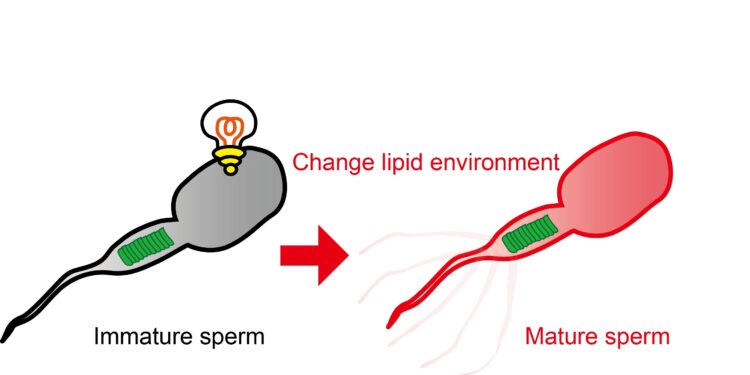Maturing sperm perceive “electrical signals.” Immature sperm perceive “electrical signals,” and the lipid composition of the cell membrane is appropriately regulated by enzyme activity. Credit: Takafumi Kawai
Frankenstein’s monster was brought to life by the clever application of a little electricity. But a surprising number of processes in our bodies are also regulated by electrical currents. Now, Japanese researchers reveal that electricity may play a key role in male fertility.
In a study published in Nature CommunicationsResearchers at Osaka University reveal that a protein whose activity depends on electrical signals plays a crucial role in sperm development. The article is titled “The importance of electrical signals in sperm maturation for the regulation of phosphoinositides by voltage-sensing phosphatase.”
Sperm go through a developmental process as they travel through the male reproductive system that allows them to mature and acquire the ability to fertilize an egg. Part of this process involves changing the types of lipids, or fatty molecules, in sperm membranes. These changes are caused by enzymes, which must be activated at a specific time during sperm development.
“We recently identified the functional expression of an unusual voltage-sensitive phosphatase (VSP) in sperm. This unique protein exhibits phosphatase activity in response to changes in cell membrane potential,” says Takafumi Kawai, lead author of the study. “However, it remains unclear whether VSP senses sperm membrane potential and, if so, how this affects sperm maturation.”
Schematic illustration showing the mVSP activation pattern in spermatozoa. Credit: Nature Communications (2024). DOI: 10.1038/s41467-024-51755-2
To investigate this question, the researchers knocked out VSP expression in mouse sperm. They then assessed the lipid content of sperm membranes at different stages of sperm development in cells without VSP versus cells with VSP.
“The results are very clear,” says Yasushi Okamura, lead author. “In the absence of VSP, the specific membrane lipid composition is not fully mature in sperm, suggesting that VSP is necessary for proper sperm development.”
The researchers then created a mutant version of the VSP protein that altered its responsiveness to electrical stimulation and tested the effects of this mutant in mice. Compared to normal mice, sperm from mice expressing the mutant protein exhibited significantly abnormal motility.
“Our results show that during sperm development, the VSP responds to electrical signals by promoting proper maturation of the cell membrane,” Kawai says.
Since proper sperm development and function are essential for male fertility, the results of this study could be used to help develop clinical treatments for infertility in the future. In addition, studying the unique mechanism by which the VSP converts electrical signals into chemical signals is likely to provide new insights into cell development.
More information:
Takafumi Kawai et al., The importance of electrical signals in sperm maturation for the regulation of phosphoinositides by voltage-sensitive phosphatase, Nature Communications (2024). DOI: 10.1038/s41467-024-51755-2
Provided by Osaka University
Quote:Study shows electrically activated protein regulates spermatogenesis (2024, August 29) retrieved August 29, 2024 from
This document is subject to copyright. Apart from any fair dealing for the purpose of private study or research, no part may be reproduced without written permission. The content is provided for informational purposes only.



